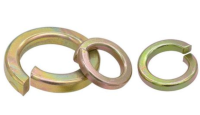Choosing the Right Lock Washer for Nuts and Bolts in Your Projects
Understanding Lock Washers The Unsung Heroes of Fasteners
In the world of mechanical engineering and construction, the reliability of fasteners—nuts and bolts—plays a crucial role in ensuring the safety and effectiveness of structures and machinery. Among the myriad components that contribute to securing these fasteners, lock washers stand out as unsung heroes. These circular pieces of metal, often seemingly inconsequential, provide a vital function in preventing nuts and bolts from loosening due to vibrations or other external forces. In this article, we will explore the various types of lock washers, their applications, and why they are indispensable in various industries.
What Are Lock Washers?
Lock washers are specialized washers designed to prevent loosening of a nut and bolt assembly, particularly in applications where vibrations are common. They are typically made from materials like steel or stainless steel, and their shape is engineered to create friction against the nut or bolt head. When installed, lock washers exert a spring-like force that resists rotation, thereby maintaining the tightness of the assembly.
Types of Lock Washers
Lock washers come in several types, each with unique properties and applications
1. Split Lock Washers Perhaps the most common type, split lock washers feature a spiral shape with a gap, creating tension against the fastener as it is tightened. This design allows it to compress under pressure while providing the necessary friction to keep the assembly secure.
2. Tooth Lock Washers Available in two variations—internal and external—tooth lock washers have teeth that dig into the surface of the nut or bolt and the material they are fastening into. This design enhances gripping power, making them ideal for high-vibration applications.
3. Belleville Washers Also known as disc springs, Belleville washers are conical in shape and can provide a significant amount of axial load even with minimal deflection. Their adaptable compression makes them suited for applications requiring constant force, such as in automotive and aerospace engineering.
4. Wavy Washers These have a wavy or undulating surface that allows them to absorb shocks effectively. While comparatively less common, they provide an excellent solution in situations where space constraints prevent the use of bulkier washers.
Applications of Lock Washers
lock washer nut or bolt side product

Lock washers are utilized across various industries including automotive, aerospace, manufacturing, and construction. Their ability to maintain tight connections under extreme conditions makes them ideal for
- Automotive Assemblies In a vehicle, components are subject to constant vibrations
. Split lock washers and tooth lock washers are extensively used in engines and other mechanical systems to prevent fasteners from coming loose over time.- Aerospace Engineering In aircraft, safety is paramount. Lock washers ensure that critical components remain securely fastened despite environmental stresses such as turbulence and changes in altitude.
- Heavy Machinery and Equipment In construction and industrial settings where heavy machinery operates, lock washers help maintain the integrity of fastened joints, reducing the risk of equipment failure.
Why Are Lock Washers Important?
Lock washers are essential for several reasons
1. Safety The most critical function of a lock washer is to ensure the safety of mechanical assemblies. Loose bolts and nuts can lead to catastrophic failures, resulting in serious injuries or fatalities.
2. Cost-Effectiveness By preventing fasteners from loosening, lock washers reduce maintenance needs and the costs associated with repairs and replacements.
3. Performance Reliability Industries that depend on high performance rely on lock washers to maintain consistent operation. Without the assurance that fasteners will stay secure, the entire system's reliability is compromised.
Conclusion
In summary, while they might appear simple, lock washers play a crucial role in the effectiveness and reliability of nuts and bolts in various applications. Their capacity to withstand vibrations and maintain tight connections underscores their importance in ensuring safety and performance in numerous industries. As mechanical systems continue to evolve and demand greater reliability, the significance of lock washers will undoubtedly remain paramount. Understanding their types, applications, and benefits is essential for anyone involved in design, engineering, or maintenance of mechanical systems.
-
Top Choices for Plasterboard FixingNewsDec.26,2024
-
The Versatility of Specialty WashersNewsDec.26,2024
-
Secure Your ProjectsNewsDec.26,2024
-
Essential Screws for Chipboard Flooring ProjectsNewsDec.26,2024
-
Choosing the Right Drywall ScrewsNewsDec.26,2024
-
Black Phosphate Screws for Superior PerformanceNewsDec.26,2024
-
The Versatile Choice of Nylon Flat Washers for Your NeedsNewsDec.18,2024










